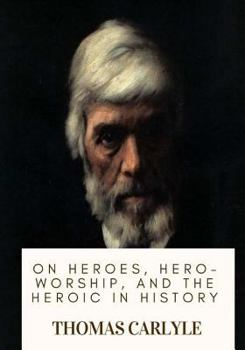On Heroes, Hero-Worship, and the Heroic in History
Select Format
Select Condition 
Book Overview
The greatest and most enduring of the prophets of the Victorian era, Thomas Carlyle was prescient about the importance of heroism in defining a nation's ambition and character. First published in... This description may be from another edition of this product.
Format:Paperback
Language:English
ISBN:1719138311
ISBN13:9781719138314
Release Date:May 2018
Publisher:Createspace Independent Publishing Platform
Length:104 Pages
Weight:0.43 lbs.
Dimensions:0.2" x 7.0" x 10.0"
Customer Reviews
3 ratings
We can't do without Heroes
Published by Thriftbooks.com User , 22 years ago
This is an extraordinary work, let modern liberal critics say what they will of their 'mass movements' and 'diversity'. Long after they and their productions have bitten the dust, Carlyle will continue to speak to the enlightened few, and perhaps one day, it is to be hoped, to the enlightened many.This work is much more than just a study of various influential men in history. Carlyle has very interesting notions of the historical process itself, the spread of religions and their demise, the importance of "true belief" in things, as opposed the unbelief that merely follows rituals and procedures. For Carlyle, true belief, is the beginning of morality, all success, all good things in this world; Unbelief, scepticism, the beginning of all corruption, quackery, falsehood.Unbelief, for instance, is at the root of all materialist philosophies, eg Utilitarianism which find human beings to be nothing more than clever, pleasure-seeking bipeds. It is also at the root of all democratic theories: faith in a democratic system means despair of finding an honest man to lead us.Whether one agrees with Carlyle or not in his appraisal of democratic and other systems, one must admit, at least, that very little good is to be gotten from "the checking and balancing of greedy knaveries." If we have no honest men in government or in business, but only a bunch of self-interested quacks, then we cannot expect any system, however ingenious, to save us. Even the most skilled architect will not be able to construct a great building, if you give him only hollow, cracked bricks to build it with. Find your honest men, says Carlyle, and get them into the positions of influence; only then will it be well with you.
Praise for the individual
Published by Thriftbooks.com User , 23 years ago
Six lectures delivered by Carlyle in 1840. He classifies six kinds of heroes: as Divinity (Wotan, paganism); Prophet (Mohamed); Poet (Dante, Shakespeare); Priest (Luther, Knox); Man of Letters (Johnson, Rousseau, Burns); and Ruler (Cromwell, Napoleon). The trait that defines a hero is: absolute sincerity and firm belief in his principles. In his highly rhetorical lectures, Carlyle highlights and reinforces the role of the individual in the social process, as opposed to the role of the masses. And he did that precisely when the foundations were being laid for the most influential "pro-mass" movement in History: Marxism. The tragedy of Marxism, at least one of them all, is that, when translated into action, the blind masses were also led by "heroes" of the most authocratic sort. Not properly the work of an historian, these lectures are vivid, inflamed and enthusiast. Their uselfuness for our present age is precisely that they remind us of the crucial role significant individuals play in history, to accelerate or slow down (and even reverse) the process of social change, which is usually more gradual, diffused, and diverse.
Six vigorous meditations on the role of the hero in history.
Published by Thriftbooks.com User , 26 years ago
Carlyle is not properly a historian or a philosopher, but a moralist, a fervent admirer of excellence, and a prose-poet of the first rank. Six meditations deal respectively of the hero as: Divinity, Prophet, Poet, Priest, Man of Letters, and King. If this book can't rightly be shelved with philosophy or history, it belongs in Literature with a capital "L," and Poetry. Carlylye loved the English Language and used it masterfully, energetically, and reverentially, without a trace of the trivial overindulgence of self-conscious and self-absorbed "poets."






